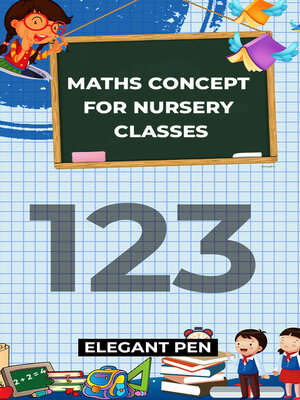MATHS CONCEPT FOR NURSERY CLASSES
ebook ∣ Building a Strong Mathematical Foundation: Exploring Numbers, Shapes, and Problem-Solving in Nursery Classes.
By Elegant Pen

Sign up to save your library
With an OverDrive account, you can save your favorite libraries for at-a-glance information about availability. Find out more about OverDrive accounts.
Find this title in Libby, the library reading app by OverDrive.



Search for a digital library with this title
Title found at these libraries:
| Library Name | Distance |
|---|---|
| Loading... |
Mathematics concepts for nursery classes lay the foundation for future mathematical learning. Through engaging activities and hands-on experiences, children explore numbers, shapes, patterns, and measurements. They develop an understanding of counting, sorting, and comparing, as well as problem-solving skills. Teachers create a stimulating environment where children explore math through play, puzzles, and real-life applications. With guidance, nursery-aged children gain confidence in number recognition, writing, and basic mathematical vocabulary. These early math experiences foster critical thinking, logical reasoning, and a positive attitude toward math, setting the stage for future mathematical growth.
As children embark on their mathematical journey in nursery classes, they are introduced to the exciting world of numbers and counting. Through interactive activities, they learn to recognize and name numbers, count objects, and understand the concept of quantity. They develop one-to-one correspondence skills, understanding that each number corresponds to a specific quantity of objects. Engaging games, songs, and manipulatives make learning numbers a joyful and multisensory experience.
Shapes and patterns also captivate young learners in nursery classes. Children explore the world around them, identifying and naming basic shapes such as circles, squares, triangles, and rectangles. They learn to distinguish between different shapes and notice their presence in their environment. Building with blocks, puzzles, and creative play allows children to investigate shapes and develop spatial awareness. Recognizing and extending patterns further stimulates their critical thinking and problem-solving abilities.
Measurement and size concepts come to life as nursery-aged children explore the concepts of big and small, long and short, or tall and short. Through hands-on experiences, they compare objects, estimate lengths, and explore basic measurements using non-standard units. These experiences provide a solid foundation for understanding size relationships and foster their spatial reasoning skills.
Nursery classes also provide opportunities for sorting and classifying activities. Children engage in tasks where they group objects based on various attributes such as color, shape, size, or texture. Sorting and classifying enhance critical thinking and help children make connections and identify similarities and differences among objects.
Problem-solving and critical thinking are nurtured in nursery classes as children engage in activities that encourage them to analyze, evaluate, and find solutions. Through puzzles, games, and open-ended questions, they develop their problem-solving skills and learn to think creatively and logically.
In conclusion, nursery classes lay the groundwork for a solid mathematical foundation. By engaging in hands-on activities, playful exploration, and interactive experiences, children develop their understanding of numbers, shapes, patterns, measurement, sorting, and problem-solving. These early math concepts not only build mathematical skills but also foster critical thinking, spatial awareness, and a positive attitude toward math. Nursery classes provide a stimulating environment where young learners embark on a mathematical adventure, setting the stage for further mathematical exploration in their educational journey.







